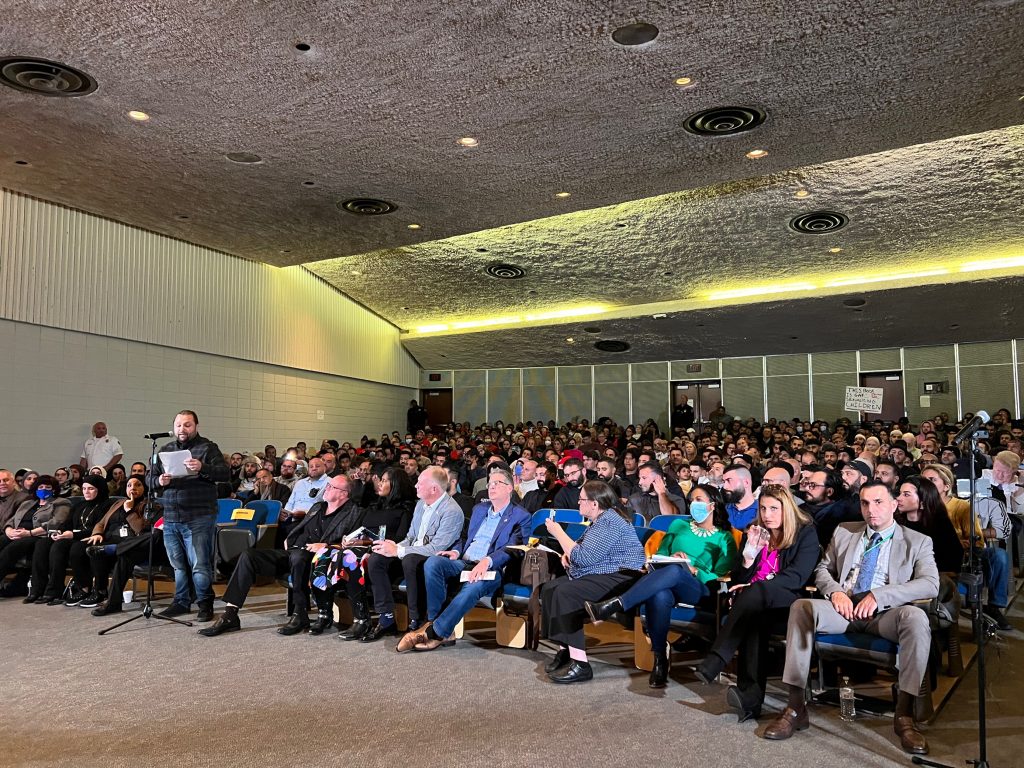MichMash: Don’t sleep on your local school board race
In this episode, Cheyna Roth sits down with The Advance’s Allison Donahue to talk about what happens when politics come into play in non-partisan school board races.

An audience member addresses the Dearborn school board at a meeting discussing whether six books should stay in the district's school libraries on October 13, 2022.
Michigan’s midterm election is this week, and the typically quiet school board races have become very active across the state. In this episode of MichMash, Cheyna Roth sits down with The Advance’s Allison Donahue to talk about what happens when politics come into play in non-partisan school board races, and why you shouldn’t sleep on your local school board candidates.
Subscribe to MichMash on Apple Podcasts, Spotify, NPR.org or wherever you get your podcasts.
In this episode
- Michigan is seeing school board elections become increasingly politicized.
- Politics have started to complicate the school board race and its respective communities.
- Voters hold mixed views on Governor Gretchen Whitmer’s approach toward the upcoming election.
Michigan non-partisan school board races are starting to receive more political attention as the Nov. 8 election advances.
Michigan Advance author Allison R. Donahue said Michigan residents have become passionate in expressing their concerns regarding what children are learning in school.
“Folks are really heated up, especially about some of the hot button cultural topics that we’re seeing like critical race theory or some books… some parents want to see banned, gender identity being talked about in the classroom and other curriculum topics that’s really getting folks heated up,” Donahue said.
Donahue said the politics brought into school board races will provide future challenges to communities.
“There’s something to be said about bringing politics into a non-partisan race when it is so tight knit, and it’s a community and the folks know each other,” she said. “I mean, that is one way that politics has really complicated the school board race and complicated communities. And I think that’s going to be a challenge that these communities will have to deal with later on.”
This year, Donahue said there’s a larger audience and politicization of the school board due to the ongoing issues that have started since the pandemic.
“This one seems to snowball. I think that’s what makes this one feel so different — is that it started with COVID-19 in a lot of ways and mass mandates and then critical race theory, the transgender and gender-inclusive bathrooms at Williamson that… really sparked conversation,” Donahue said. “So we’ve been seeing this gradually build and now school boards and folks that are looking at school boards have a mountain of issues that they want to see addressed, which I think raises the pressure, raises folks’ emotions about it.”
With the upcoming election, Governor Gretchen Whitmer and Republican Party candidate Tudor Dixon have taken different approaches in responding to education for children in Michigan schools. Donahue says Dixon has taken a more front-line approach.
“Tudor Dixon has been really successful with building a base. She has Moms for Liberty behind her, they endorsed her a while back and Moms for Liberty is this growing group of really fired up moms,” she said. “I haven’t seen Whitmer touch that as much, but she also has four years under her belt that she can lean on. She passed the state’s largest K-12 education budget and that’s mostly what she has been focusing on. It seems like she’s not really trying to give much air time to some of the issues that Tudor Dixon has really been campaigning on.”
Related posts:
- Detroit Evening Report: Dearborn school board meeting about book bans draws hundreds
- Races for MI Supreme Court seats are high stakes and under the radar
- Democrats eye control of Michigan Senate for first time in decades
Trusted, accurate, up-to-date.
WDET strives to make our journalism accessible to everyone. As a public media institution, we maintain our journalistic integrity through independent support from readers like you. If you value WDET as your source of news, music and conversation, please make a gift today.
